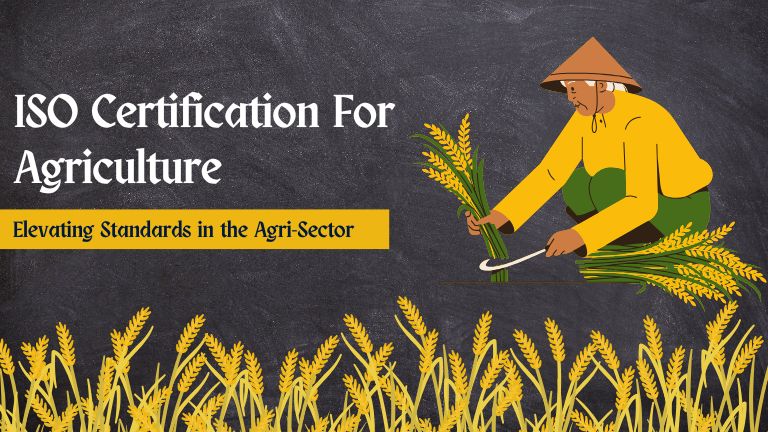Agriculture is the backbone of many economies, providing food, raw
materials, and employment to millions worldwide. As the global population grows
and consumer expectations evolve, the agriculture sector faces increasing
pressure to ensure quality, safety, sustainability, and efficiency. ISO
certification serves as a vital tool to address these challenges and set
benchmarks for excellence in agriculture. This article explores the significance
of ISO certification for agriculture, its benefits, key standards, and the
steps involved in obtaining certification.
Understanding ISO Certification in Agriculture
ISO (International Organization for Standardization) is a globally
recognized entity that develops and publishes standards across various
industries. ISO certification demonstrates that an organization adheres to
internationally accepted standards, ensuring consistency and quality in its
operations and products.
In agriculture, ISO certification applies to various aspects, including
food safety, environmental management, sustainable farming practices, and
quality management systems. These certifications are not only a testament to a
producer’s commitment to excellence but also a key to unlocking global market
opportunities.
Key ISO Standards Relevant to Agriculture
Several ISO standards are particularly pertinent to the agriculture
sector. Here are some of the most significant ones:
1- ISO
22000: Food Safety Management Systems
- Ensures
the safety of food products from farm to fork.
- Integrates
the principles of Hazard Analysis and Critical Control Points (HACCP).
- Helps
organizations comply with global food safety regulations.
2- ISO
9001: Quality Management Systems- Focuses
on improving product quality and customer satisfaction.
- Encourages
consistent processes and continuous improvement.
- Applicable
to all types of agricultural organizations, including farms, processing
units, and distribution centers.
3- ISO
14001: Environmental Management Systems- Addresses
environmental sustainability in farming practices.
- Encourages
efficient use of resources and reduction of environmental impact.
- Enhances
compliance with environmental regulations.
4- ISO
26000: Social Responsibility- Provides
guidance on integrating socially responsible practices in agricultural
operations.
- Promotes
ethical labor practices, community engagement, and sustainable farming
methods.
5- ISO
50001: Energy Management Systems- Focuses
on improving energy efficiency in agricultural operations.
- Helps
reduce energy consumption and costs.
6- ISO
14046: Water Footprint- Assesses
and manages water usage in farming.
- Supports
sustainable water management and conservation efforts.
Benefits of ISO Certification in Agriculture
ISO certification offers a plethora of advantages to agricultural
businesses, ranging from enhanced operational efficiency to increased
marketability. Here are the key benefits:
1- Improved
Product Quality
- Certification
ensures adherence to high-quality standards, resulting in better
agricultural products.
- Consistent
quality builds trust among consumers and stakeholders.
2- Global
Market Access- ISO
certification is recognized worldwide, facilitating entry into
international markets.
- Demonstrates
compliance with global standards, which is often a prerequisite for
export.
- Adhering
to ISO 22000 helps minimize risks associated with food contamination.
- Boosts
consumer confidence in the safety of agricultural products.
4- Environmental
Sustainability- Standards
like ISO 14001 encourage sustainable farming practices, reducing the
environmental footprint.
- Promotes
resource conservation and waste management.
5- Cost
Efficiency- Streamlined
processes and better resource management lead to cost savings.
- Reduces
waste and energy consumption, enhancing profitability.
6- Compliance
with Regulations- Certification
ensures adherence to local and international regulatory requirements.
- Reduces
the risk of legal penalties and enhances reputation.
7- Increased
Credibility and Trust- ISO
certification signals a commitment to quality and sustainability.
- Builds
confidence among consumers, investors, and partners.
8- Continuous
Improvement- Encourages
organizations to adopt a culture of ongoing improvement.
- Helps
identify and address inefficiencies in operations.
Steps to Obtain ISO Certification for Agriculture
The process of obtaining ISO certification involves several stages. Here
is a step-by-step guide for agricultural organizations:
Identify
Relevant ISO Standards- Determine
which ISO standards are most applicable to your operations and goals.
- For
instance, a farm focusing on exports might prioritize ISO 22000 for food
safety.
Gap
Analysis- Assess
your current operations against the requirements of the chosen ISO
standard.
- Identify
gaps and areas for improvement.
Develop
an Implementation Plan- Create
a detailed plan to address gaps and align operations with the standard.
- Assign
roles and responsibilities to team members.
Training
and Awareness- Train
employees and stakeholders on the requirements and benefits of the ISO standard.
- Ensure
everyone understands their role in achieving compliance.
Documentation- Develop
and maintain comprehensive documentation, including policies, procedures,
and records.
- This
is essential for demonstrating compliance during audits.
Implementation- Put
the plan into action, making necessary changes to processes and systems.
- Monitor
progress and address challenges as they arise.
Internal
Audit- Conduct
an internal audit to assess readiness for certification.
- Identify
and rectify any non-conformities.
External
Audit- Engage
an accredited certification body to perform an external audit.
- The
auditor will evaluate compliance with the standard and recommend
certification if requirements are met.
Certification- Upon
successful audit, the certification body issues the ISO certificate.
- Certification
is typically valid for three years, with periodic surveillance audits.
Continuous
Improvement
- Maintain
compliance through regular reviews, updates, and improvements.
- Prepare
for recertification by staying aligned with evolving standards.
Conclusion
ISO certification is a transformative certificate for the agriculture sector,
fostering quality, safety, and sustainability. By aligning operations with
globally recognized standards, agricultural organizations can enhance their
competitiveness, build trust, and contribute to a more sustainable future.
Whether you are a small farm or a large agribusiness, investing in ISO
certification is a step toward excellence that pays dividends in reputation,
efficiency, and market access. As the demand for safe and sustainable
agricultural products continues to grow, ISO certification will remain a
cornerstone of success in the agri-sector.

